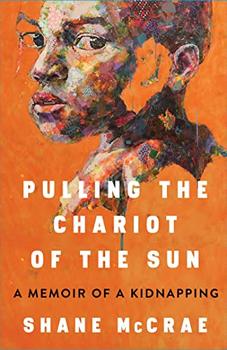Summary | Excerpt | Reading Guide | Reviews | Beyond the Book | Read-Alikes | Genres & Themes | Author Bio

A Memoir of a Kidnapping
by Shane McCraeThis article relates to Pulling the Chariot of the Sun
 As Shane McCrae documents in Pulling the Chariot of the Sun, he was born to a black father and a white mother. He lived alternately with both parents for three years until his maternal grandparents convinced his father to let him visit them for the weekend. When his father went to pick him up at the agreed time, the house was empty: "There was no sign of where they had gone."
As Shane McCrae documents in Pulling the Chariot of the Sun, he was born to a black father and a white mother. He lived alternately with both parents for three years until his maternal grandparents convinced his father to let him visit them for the weekend. When his father went to pick him up at the agreed time, the house was empty: "There was no sign of where they had gone."
Far from model guardians, his grandparents were physically abusive and racist, taunting blacks they saw on television and in person, telling him black people were inferior. Unsurprisingly, McCrae was a miserable student, failing most years he was enrolled until October 25, 1990, when he heard lines from Sylvia Plath's poem "Lady Lazarus" on the television drama Silence of the Heart: "Dying/Is an art, like everything else./I do it exceptionally well." These lines struck McCrae in the gut. And heart. And head. That night he wrote and wrote and wrote. Within a year, he decided to become a poet. In an interview with Carlos Barragán for Columbia University School of the Arts, he explained, "Poetry came to my rescue. I didn't have any special skill at it. I was exceptionally bad at it, but because I didn't know anything about it, I went on and I decided to commit my life to poetry."
McCrae has now been referred to as an "alarmingly prolific" writer. A graduate of the prestigious Iowa Writers Workshop, he also has a law degree from Harvard. His poems center around oppression, violence, and pain. History matters to McCrae. He told PEN America, "For me, writing into history is a way to grapple with the terrifying certainty of the present. That is, the more one studies and writes with history, the more often one discovers that apparently large and important human developments—a lot of things most people would call 'progress'—are superficial."
His poetry has been featured in The Best American Poetry, American Poetry Review, African American Review, Fence, and AGNI, among other publications. He is the author of several poetry collections, including In the Language of My Captor (2016), Sometimes I Never Suffered (2020), and Cain Named the Animal (2022). He has received the Lannan Literary Award, the Arthur Rense Poetry Prize, the Michael Marks Award, and fellowships from the Guggenheim Foundation, the National Endowment of the Arts, and the New York Foundation for the Arts. He has been a finalist for the Forward Prize, the Maya Angelou Book Award, the T.S. Eliot Prize, the National Book Award, and the Los Angeles Times Book Prize.
In his poem "Remembering My White Grandmother Who Loved Me and Hated Everybody Like Me," he writes: "I/Remember her teaching me how to hail/Hitler us shouting in the living room." He has said he concentrates on the logic of a poem before the message.
The New Yorker has described McCrae as a "shrewd composer of American stories," remarking, "His poems often piece together, for a striking effect, swatches of material from divergent sources." Many of his poems are stories of grief and suffering but also an accounting of living in a disparate world.
When asked by Barragán what makes a true poet, McCrae responded, "A poet is anybody interested in utilizing language in a compressed way to explore the world in their own thoughts. When writing a poem, you have to get your self-consciousness and ego out of the way. Writing a poem is mostly about listening."
He writes with the first line as his map. It leads him to the next line. One step forward and then silence. Quiet. Waiting. Poetry isn't to be hurried. It takes its time, as does McCrae. In the opening lines of his poem "Home After Traveling," he writes: "We all at once are different people, loved/Unchanged, but new to each other."
Photo of Shane McCrae, courtesy of Simon & Schuster
Filed under Books and Authors
![]() This article relates to Pulling the Chariot of the Sun.
It first ran in the September 6, 2023
issue of BookBrowse Recommends.
This article relates to Pulling the Chariot of the Sun.
It first ran in the September 6, 2023
issue of BookBrowse Recommends.
No pleasure is worth giving up for the sake of two more years in a geriatric home.
Click Here to find out who said this, as well as discovering other famous literary quotes!
Your guide toexceptional books
BookBrowse seeks out and recommends the best in contemporary fiction and nonfiction—books that not only engage and entertain but also deepen our understanding of ourselves and the world around us.